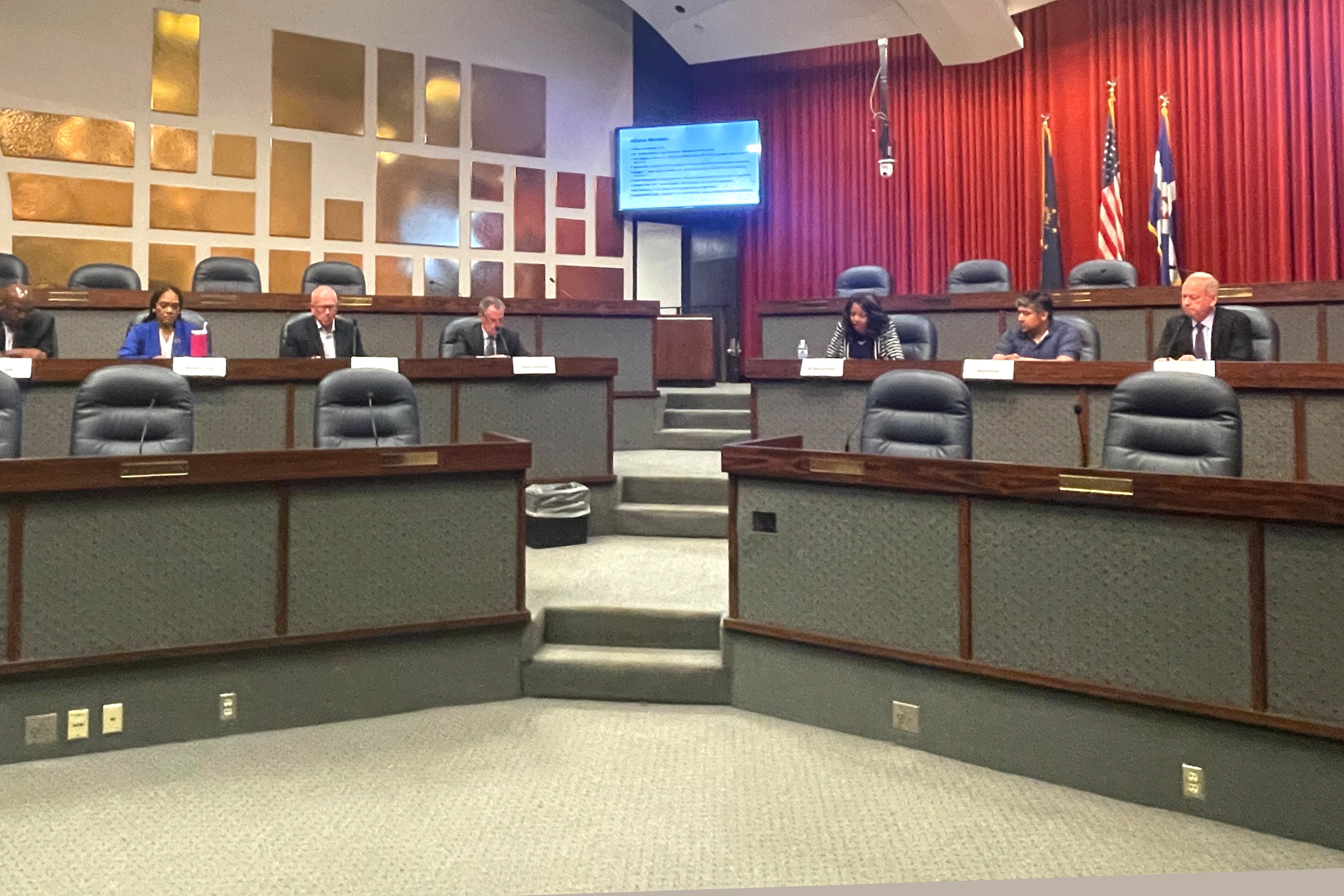Sign up for Chalkbeat Indiana’s free daily newsletter to keep up with Indianapolis Public Schools, Marion County’s township districts, and statewide education news.
The first meeting of the Indianapolis Local Education Alliance set the stage for the group’s work, emphasizing collaboration and maintaining focus on students and their experiences while also keeping historical context and accountability in mind.
“We are here tonight to begin a new chapter of collaboration for the future of education in the city of Indianapolis,” said Mayor Joe Hogsett, chair of the ILEA, at the beginning of the meeting.
The nine-member ILEA was created by state lawmakers earlier this year and could shape the future of charter and traditional public schools in Indianapolis. The group is tasked with examining solutions for facility and transportation management across Indianapolis Public Schools and the charter schools within its borders, as well as addressing school governance structure and efforts to increase efficiency.
The group includes Hogsett and IPS superintendent Aleesia Johnson as well as their appointees and must provide a set of recommendations to IPS, city, and state leaders by the end of 2025.
The recommendations will be a “data driven and actionable plan” that will lead to a “more rational, more equitable, and more sustainable system of school facilities and transportation that benefits all students in Indianapolis,” Hogsett said.
He said the plan will be a roadmap for collaboration between schools and could include ideas such as co-locating, sharing services, and consolidating.
The ILEA will start its work with data collection and members made several requests for data during the meeting. The group could also issue a request for qualifications for an outside firm to help with that work in addition to those from IPS and the mayor’s office already working on data collection, Hogsett said, adding there would be more details about that process at the next meeting.
Johnson stressed the need to also look beyond the data to the historical context and the impact of policy decisions over decades.
“As we are collecting data and doing those things, I don’t want us to lose sight of what has happened over 50 years ago to bring us to this place today,” she said, adding that she also wants to keep in mind the collaboration that has happened.
Wednesday’s meeting included a presentation from Andrew Strope, IPS deputy superintendent, and Shaina Cavazos, director of the Mayor’s Office of Education Innovation, that gave an overview of the history and the policies shaping education in the city such as the creation of Unigov in 1970, which intentionally left school districts out while unifying city-county government and the 2001 state law allowing for charter schools.
After spending the summer collecting data, the plan is to dive into the data in the fall and then spend late fall working on and refining recommendations before they are proposed by the end of the year, Hogsett said.
The introductory ILEA meeting follows a tense legislative session where the group was created, as well as a proposal aimed to dissolve IPS and replace it with charters. That bill ultimately failed, and a successful plan to redirect some property tax revenue from IPS to charters was approved. Starting in 2028, charter schools, which have grown in enrollment as IPS enrollment has dipped, will receive a portion of property tax funding that has been for traditional public schools in the past.
Money from property taxes is used by traditional school districts for operations including transportation and building maintenance. Charter school advocates have argued that the lack of property tax funding contributes to their struggle to offer transportation to students who want to attend.
And charters are tasked with finding buildings to open in. The $1 law allows charters to buy or lease vacant school buildings for $1, but is often formally challenged when schools try to use it.
During the legislative session, IPS called for a moratorium on new schools in its boundaries, and lawmakers prohibited new charters from July to December of this year, except for those schools approved by the mayor’s office.
On Tuesday, the Indianapolis Charter School Board approved Legal Prep Charter Academy to open in 2026, meaning it would be the first new school to open in Indianapolis since the end of the legislative session.
At the ILEA meeting on Wednesday, a dozen people spoke during public comment, urging the ILEA to make sure all children in Indianapolis have good schools to attend, regardless of the type. Speakers also stressed that a lack of transportation can limit school choice, asked the group to look at school collaboration models that are working, and called for greater school accountability, largely for charter schools.
They told the group it had the opportunity to change the competitive school choice environment in Indianapolis and collaborate in a way that benefits all students.
“You all are going to be asked to make some impossible decisions that will likely upset a lot of people, so thank you all for taking on that burden,” said Arion Clanton, who said he’s worked as both a teacher and a coach.
Clanton told the ILEA that solutions need to be longstanding and not one-size-fits all. He also urged the group to keep in mind the kids and families affected by the systems it is addressing.
Additional public comments submitted online were shared with the ILEA members and will be posted online, Cavazos said.
The ILEA is exempt from the state’s Open Door Law, which requires public agencies to make meetings open to the public; however, it does plan to have multiple public meetings like Wednesday’s. State law requires the group to meet publicly to vote on the final recommendations.
The next public meeting of the ILEA is 6 p.m. July 23 at the City County Building at 200 E. Washington St. A calendar of meetings and agendas is on the ILEA website.
MJ Slaby oversees Chalkbeat Indiana’s coverage as bureau chief. Contact MJ at mslaby@chalkbeat.org.





